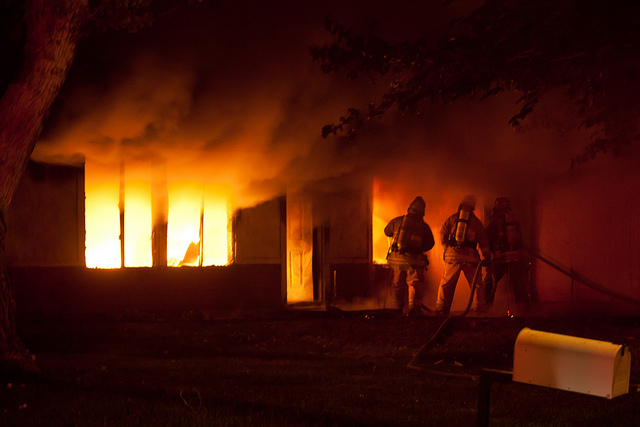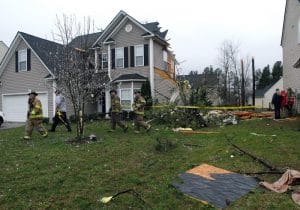How to Deal with a Major Loss from a Fire
Fires are among the most destructive disasters that can occur as they have been known to destroy entire homes and everything within in just a short period of time. The magnitude of the losses due to fire damage can be huge because the loss is actually multiple losses; important documents, family photos, clothes, furniture, personal possessions, and even the house itself, leaving a family without a home.
These losses can be difficult to handle as you have not only lost all your worldly possessions, but also the place where you have found comfort and called home every day. Everyone dealing with significant fire damage losses goes through a period of grieving and readjustment and knowing the typical stages of the grieving and how to take care of yourself during such a difficult time will help you better endure the readjustment period.
Coping with Fire Loss: 5 Stages of Loss and Grief

Fires are among the most destructive disasters that can occur in a home
There are five stages of loss and grief that are generally applied to all instances of loss, whether it be a death in the family or the sudden loss of your home and belongings from fire damage.
Shock
Shock is the first stage of grieving as many who lose their homes to a fire are initially shocked by what happened, especially since a fire can cause significant damage very quickly, and fail to register the extent of the damage. In this stage, those affected by the loss have difficulty fully understanding what has happened and at least temporarily, they may become emotionally numb or confused. However, the initial shock is beneficial because it prevents people from taking in the full magnitude of the tragedy all at once.
Anger, Depression and Hopelessness
As the shock wears off, the next three stages of dealing with significant loss develop which include anger, depression, and hopelessness. These reactions tend to alternate within the same period of time which is why they are not separated into clearly defined stages.
Depression from a major loss usually manifests itself as anxiety, insomnia, and crying fits which can also affect a person’s energy level and appetite. It is also common for those who have lost their homes to a fire to feel hopeless because the loss happened so quickly and they may get hung up on the “what ifs,” especially since many may believe that the fire was preventable. Fits of anger can also manifest in between feelings of depression and hopelessness directed at anyone or anything perceived to contribute to their current state.
The last stage of loss and grief is acceptance in which people are finally able to let go of the anger and depression and experience hope and happiness again. In regards to fire losses, acceptance is much easier after a new home is found and significant steps are taken to re-establish a normal life.
Taking Care of Yourself after a Fire Loss
As those who suffer a loss go through the stages of grieving, they may be so consumed in the anger and sadness that they do not adequately take care of themselves or their personal hygiene. However, it is important for a person going through the grieving process to continue to care for themselves to aid their healing and acceptance. These strategies can help someone going through the grieving process take good care of themselves as they grieve:
- Avoid mood altering substances like alcohol
- Get as much rest or sleep as you can
- Make sure to eat full, regular meals
- Try deep breathing, meditation, and other stress relieving activities
- Allow yourself to feel bad during the process but also allow yourself to have feelings of joy
- Continue to make small decisions for yourself to regain control of your life but avoid major life decisions temporarily if you can
- Spend time with friends and family and talk to them or maybe even a counselor about your loss
- Try to think about and remember the good that is still in your life
A house fire can be a pretty devastating experience, especially if the entire home and everything within it is destroyed. The suddenness of such a disaster can cause a terrible shock that gives way to anger, depression, and hopelessness before those affected can finally accept the losses they have experienced. It helps for a person to be familiar with the typical stages of grief when going through the grieving process themselves after a fire loss.
Fire Damage RestorationFire damage restoration is the process of repairing and rest... More
Practicing effective fire prevention strategies is the best way to prevent fire losses of this magnitude and if your home is affected by fire damage at all, it is crucial to call a fire damage restoration professional right away. Reacting quickly after a fire could mean the difference between salvaging and losing your home and personal belongings.
When it comes to saving your belongings, these technicians will take all action necessary to prevent any and all permanent damage to your home and personal items. First boarding up and stabilizing your home to prevent the risk of collapse, they will then remove all high-value items for pre-cleaning to prevent the need for replacement. All remaining hard surfaces will be wiped clean of smoke and sootSoot is fine black particles composed of carbon and other ma... More residueResidue is any leftover material, such as soot, dust, or che... More, including porcelain, Formica, chrome, aluminum, stainless steel and more.
All soiled porousPorous describes a material that contains small openings or ... More materials will also be removed. Any water damage from the fire hose will also be restored using powerful dryingDrying is the process of removing moisture from materials, s... More and extraction equipment. Remaining smoke odors will be eliminated using advanced technology. Finally, they will work with your insurance adjuster during the claims process to allow for additional peace of mind.
When it comes to restoring your home and belongings, taking action is crucial as it can save significant time, energy and money in the long run, which will all have an impact on the grieving process.












